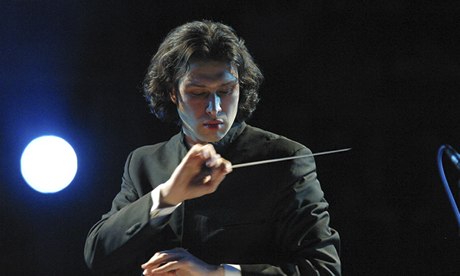
Commissioned for the consecration of the new Coventry Cathedral, Britten's War Requiem made a huge impression in 1962 and has remained central to the English choral tradition, though it's a piece that also originally had a specifically international agenda. This performance by the LPO under Vladimir Jurowski emulated Britten's original intention of bringing together for the premiere soloists from three countries involved in the second world war – the UK, Germany and Russia – an idea thwarted by the refusal of the Soviet authorities to allow Galina Vishnevskaya to take part.
Standing in on this occasion for the indisposed Tatiana Monogarova, Evelina Dobračeva was the vibrant soprano soloist, leading those sections directly setting the Latin Mass for the Dead. Interspersed throughout, Wilfred Owen's poems were sung by tenor Ian Bostridge and baritone Matthias Goerne; the works both commented on the traditional liturgical text and at times threw it into ironic relief.
Goerne's occluded English was offset by the vehemence and emotional largesse of his vocalism, which contrasted with Bostridge's more internalised, less vividly coloured approach. But Bostridge, too, opened up for the Agnus Dei, with its image of a crucifix in a shelled landscape, and for the war-scarred limbo of Strange Meeting. Here the distant voices of Trinity Boys Choir filtered in ethereally, even if earlier in the performance they had felt too far away.
But their contribution was impeccably clean and focused, as was the singing of the London Philharmonic Choir, who moved with an absolute unity of expressive purpose, and whose artistic director, Neville Creed, also fulfilled the crucial role of conducting the smaller chamber ensemble. Jurowski, meanwhile, oversaw the whole with a blend of discipline and insight that underlined the case for the score as the most persuasive of musical arguments for pacifism.
• Did you catch this show – or any other recently? Tell us about it using #gdnreview

